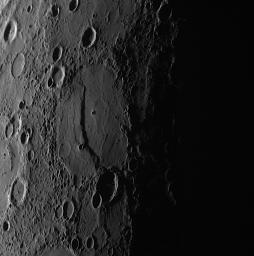Shadows Showcase a Steep Scarp
Caption:
This NAC image was taken about 55 minutes before closest approach as the MESSENGER spacecraft sped toward a crescent-lit planet during the mission's second Mercury flyby (see
PIA11247
). The large crater in the center of the image is near the terminator, the division between the dayside and nightside of the planet. The low angle of the Sun near the terminator causes the long shadows seen here, which reveal that a large scarp or cliff bisects the crater. The crater exhibits a smooth floor broken by slight ridges and seems to have been filled with volcanic lava flows. In the lower left of the crater, the outline of a smaller crater that was filled to its rim by lavas is still visible. The scarp was formed after the large impact crater was filled with the lava flows, for if the scarp had formed first, then the lavas would have flowed over the scarp and buried it.
Date Acquired:
October 6, 2008
Image Mission Elapsed Time (MET):
131766501
Instrument:
Narrow Angle Camera (NAC) of the Mercury Dual Imaging System (MDIS)
Resolution:
420 meters/pixel (0.26 miles)
Scale:
This image is about 430 kilometers (270 miles) tall
Spacecraft Altitude:
16,300 kilometers (10,100 miles)
Background Info:
These images are from MESSENGER, a NASA Discovery mission to conduct the first orbital study of the innermost planet, Mercury. For information regarding the use of images, see the MESSENGER
image use policy
.
Cataloging Keywords:
| Name |
Value |
Additional Values |
| Target |
Mercury |
|
| System |
|
|
| Target Type |
Planet |
|
| Mission |
MESSENGER |
|
| Instrument Host |
MESSENGER |
|
| Host Type |
Orbiter |
|
| Instrument |
Mercury Dual Imaging System (MDIS) |
|
| Detector |
Narrow Angle Camera (NAC) |
|
| Extra Keywords |
Crater, Grayscale, Impact, Shadow, Volcano |
| Acquisition Date |
|
| Release Date |
2009-01-13 |
| Date in Caption |
2008-10-06 |
|
| Image Credit |
NASA/Johns Hopkins University Applied Physics Laboratory/Carnegie Institution of Washington |
| Source |
photojournal.jpl.nasa.gov/catalog/PIA11772 |
| Identifier |
PIA11772 |

 Planetary Data System
Planetary Data System
